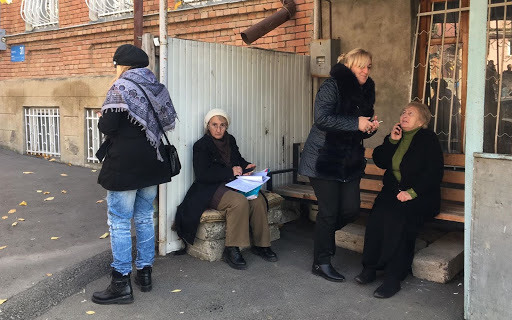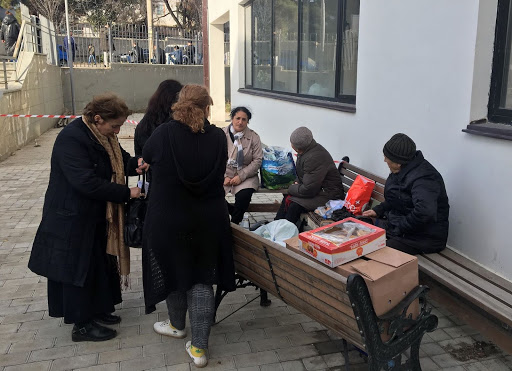
TBILISI, Georgia—In Tbilisi’s Havlabar neighborhood, a historically Armenian enclave in the Georgian city, polling stations resemble street markets. Buses unload voters surrounded by stacked boxes displaying food and other goods. Women are checking off voter names from a list, while their colleagues call those who have yet to cast their ballots.
Enthusiasm is running low. Armenian voters share a similar sense of apathy with their Georgian homologues. “All the candidates have their own interests in mind. Voters are at the bottom of their list,” says Tatev, a Tbilisi-born Armenian who skipped the vote. Anna Sarkisyan, another Tbilisi native, told the Weekly, “We’re presented with two unsavory choices. Neither offer any tangible benefits for the Armenian community.”
Liza Torosyan, a reporter who covered the election for Aliq Media, a local Armenian-language news outlet, shares the sentiment. “Georgian politicians only remember the Armenian minority when elections come along,” she tells the Weekly. Indeed, Georgia’s Armenians mostly remain underrepresented in the country’s political life. With only three ethnic-Armenians sitting in the National Assembly and a scattering involved with either of the major parties at the grassroots level, there are few outlets to discuss issues of concern to the Armenian community.
The ruling Georgian Dream Party candidate Salome Zurabichvili failed to win an outright majority in the first round of voting back on October 28. She had inched past Grigol Vashadze of the United National Movement (UNM), the party of former-president Mikheil Saakashvili, by less than one-percent of the vote. This time, GD was showing signs that it was determined to maintain its hold on the presidency. Most opinion polls predicted a Vashadze victory, as he gained the endorsements of other failed candidates. However, Bidzina Ivanishvili, Georgia’s one-time Prime Minister and wealthiest man, announced his foundation’s intention to pay off the personal debts for up to 600,000 Georgians in a last minute attempt to woo voters. Ivanishvili is also the founder and primary financier of the Georgian Dream party. Analysts have characterized the presidential election as a sort of unoffical referendum between Ivanishvili and his chief rival Saakashvili.
During this second round, observers say the Georgian Dream made liberal use of ‘administrative resources’ to swing the vote in their favor. Special buses were organized to drive people back to the towns where they are registered to vote. Many also received robocalls with a recorded statement by Ivanishvili warning of a civil war in the event of a UNM victory. Armenian voters who spoke to the Weekly also reported being under heavy pressure by the authorities to vote.

One Armenian student currently living in Tbilisi recalled receiving a phone call from her village mayor who told her that failure to vote for the Georgian Dream might mean trouble for her relatives still living there.
Zurabichvili, the only candidate to visit the Armenian-majority province of Samtskhe–Javakheti, warned voters that a UNM victory would mean the return of Saakashvili (currently exiled in Poland). Many still resent him for the closure of Armenian schools in the impoverished region.
Zurabichvili also promised to re-implement a dual-citizenship law. Nationality had remained a contentious issue for Georgian-Armenians, many of whom were forced to give up Georgian citizenship when they applied for Armenian or Russian passports, needed to find work abroad.
In a statement that garnered much controversy, Zurabichvili told crowds gathered in Akhalkalaki “Saakashvili took away your passports and gave them to the Turks,” (referring to a questionable decision by the previous government to grant citizenship to 25-thousand Turkish expats living in Batumi). According to the Central Election Committee, Zurabishvili went on to win Samtskhe–Javakheti with over 65-percent of the vote.
Though most Armenian voters seem indifferent towards either candidate, some have shown support for the Georgian Dream. Aside from the reformed citizenship law, many Armenians have benefited from electricity and gas subsidies offered to remote communities implemented by the GD government.
With the final tally of the November 28 announced, Zurabichvili became the first elected female president of Georgia, taking 60-percent of the vote. The OSCE observation mission called the election “Free but unfair.” Echoing these findings, the National Democracy Institute reported the increased use of divisive rhetoric, threats, vote buying, and abuse of administrative resources by the ruling party. There were also increased reports of bribes such as the distribution of food as well as money to voters.
The UNM, for its part, rejected results as illegitimate and organized a rally attended by some eight thousand people. However, with congratulations by foreign leaders, including Armenian PM Nikol Pashinyan and President Armen Sarkissian, pouring in, few seem ready to contest the results.


Be the first to comment